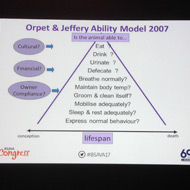Holistic approach to care plans is essential

A complete and thorough patient assessment should take place at the time of a pet's registration with the practice.
In creating a care plan, it helps to add the extra dimension of what is normal for an individual animal – which information will complement the clinical approach, surgery and nursing. Any care plan should be aimed at returning the patient to its normal routine. This was the message presented at the BSAVA Congress today by RVNs Hilary Orpet and Andrea Jeffery.
A complete and thorough patient assessment should take place at the time of a pet's registration with the practice, in order to gain this background information. This can be collected electronically via e-mail or using an App and added to the patient record and updated regularly. It is an ideal role for veterinary nurses and ensures that they are involved with each animal at an early stage of its involvement with the practice.
Rather than waiting until the patient is subsequently admitted or has a problem, this information can be collected as a part of a 'new client' interview – an opportunity to introduce them to the practice facilities and the nursing clinics available. This, in turn, increases client loyalty and also ensures that the practice has a useful record for that pet when it may be admitted later for in-patient care.
This holistic, patient-centred approach should also include an element of client assessment to make sure that any case management plans involving home care take into account the owner's lifestyle.
Both speakers emphasised how careful collection of information about a patient early on is important; because using the wrong information can lead to the wrong treatment, and gathering no information will often lead to inadequate treatment.



 Zoetis has launched a new survey to identify management techniques for Equine Herpes Virus (EHV).
Zoetis has launched a new survey to identify management techniques for Equine Herpes Virus (EHV).